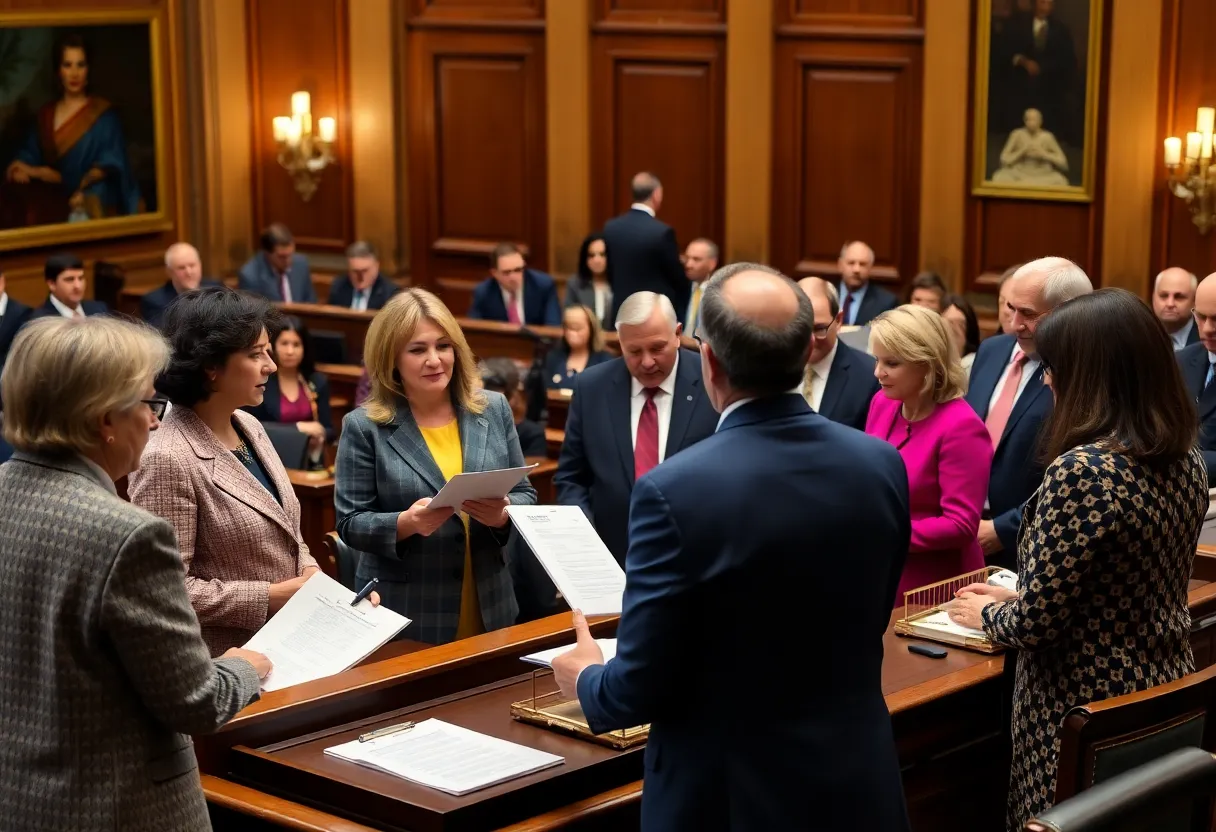News Summary
Georgia state lawmakers are considering a significant tax reform proposal aimed at phasing out the state income tax to alleviate economic pressures on residents. The initiative aims to enhance Georgia’s competitiveness with neighboring states that do not impose an income tax. While supporters highlight potential savings for taxpayers, critics express concerns about the impact on public services and the burden on low- and middle-income families. As the legislative discussions continue, the focus remains on finding a balance between tax relief and funding essential services.
Atlanta, Georgia – Georgia state lawmakers are considering a proposal to phase out the state income tax to alleviate the financial burden on residents facing rising costs for basic necessities like gas, groceries, and childcare. The push comes as the state grapples with ongoing inflation and economic challenges affecting its citizens.
Lieutenant Governor Burt Jones emphasized that Georgia’s income tax rate is currently the second-highest in the nation, trailing only South Carolina. He argued that removing the income tax is crucial for Georgia to remain economically competitive with neighboring states such as Florida and Tennessee, both of which do not impose a state income tax.
Supporters of the proposal, including Senator Blake Tillery, who chairs the Senate study committee, illustrated the potential benefits for taxpayers. For instance, a single individual earning an annual salary of $40,000 could save about $2,100 if the income tax is eliminated. Additionally, a joint household with an income of $75,000 might expect to see relief of approximately $3,900.
The income tax currently contributes around $15.7 billion annually to Georgia’s revenue, making it the largest single source of state funding. As lawmakers discuss the implications of this move, they are also exploring alternative ways to compensate for the potential revenue loss. Suggestions have included increases in sales tax and cuts to certain tax breaks aimed at special interests. According to analysis provided during the committee meetings, each percentage point increase in the sales tax could generate roughly $2 billion.
Despite the potential benefits of eliminating the income tax, critics have raised significant concerns. Some lawmakers, particularly from the Democratic party, argue that this change could lead to increased costs in other areas, impacting essential public services and recurring expenses such as utility bills and gasoline prices. They contend that the burden of higher sales taxes may disproportionately affect low- and middle-income families, exacerbating economic inequality.
Senator Tillery responded to these claims by assuring the public that core state services, including education, infrastructure, and public safety, would remain adequately funded during any transition away from the income tax.
This discussion on income tax elimination coincides with upcoming electoral campaigns, with several committee members, including Lieutenant Governor Jones and Senator Tillery, positioning themselves for higher offices. Notably, Georgia has witnessed incremental reductions in its income tax rate, which currently stands at 5.19%. These reductions have largely been facilitated by budget surpluses that have emerged post-pandemic.
Moreover, some Democrats expressed apprehension that the proposed tax relief might largely benefit wealthier residents, while lower-income families could find themselves facing higher costs in other areas. The study committee is scheduled to continue its discussions into the fall and aims to present recommendations before the beginning of the 2026 legislative session.
During the committee meeting, Grover Norquist, president of Americans for Tax Reform, provided testimony in favor of the proposal, suggesting that states can thrive without income taxes if they manage their budgets effectively and attract new businesses and residents. Furthermore, Tillery pointed out that there might be opportunities to reduce tax incentives related to income tax, arguing that businesses would not require such credits if there is no income tax owed.
The debate surrounding the elimination of the state income tax highlights the complexities involved in tax reform and the balancing act lawmakers must achieve to ensure equitable economic growth while addressing the needs of all Georgia residents.
Deeper Dive: News & Info About This Topic

Author: STAFF HERE AUGUSTA WRITER
The AUGUSTA STAFF WRITER represents the experienced team at HEREAugusta.com, your go-to source for actionable local news and information in Augusta, Richmond County, and beyond. Specializing in "news you can use," we cover essential topics like product reviews for personal and business needs, local business directories, politics, real estate trends, neighborhood insights, and state news affecting the area—with deep expertise drawn from years of dedicated reporting and strong community input, including local press releases and business updates. We deliver top reporting on high-value events such as Arts in the Heart Festival, Westobou Festival, and Masters Week. Our coverage extends to key organizations like the Augusta Metro Chamber of Commerce and Greater Augusta Arts Council, plus leading businesses in manufacturing and healthcare that power the local economy such as Textron Specialized Vehicles, Cardinal Health, and Nutrien. As part of the broader HERE network, including HEREAtlanta.com and HERESavannah.com, we provide comprehensive, credible insights into Georgia's dynamic landscape.


